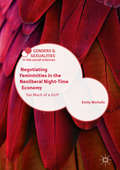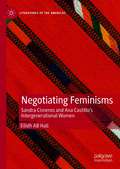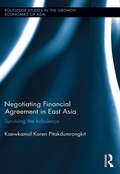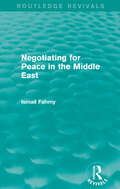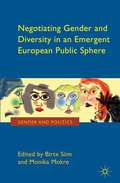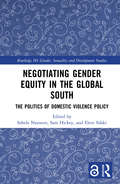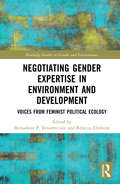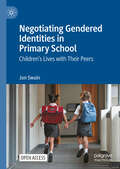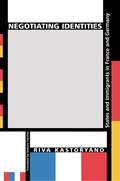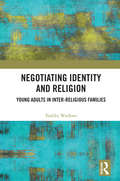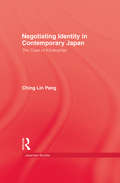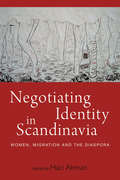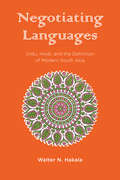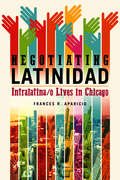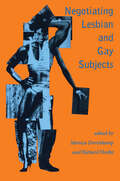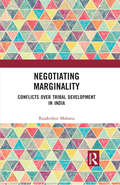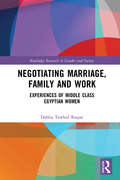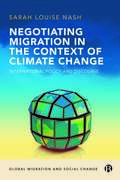- Table View
- List View
Negotiating Fatherhood: Sport and Family Practices (Palgrave Macmillan Studies in Family and Intimate Life)
by Thomas FletcherThis book examines the tensions and ambivalences which men encounter as they negotiate contemporary expectations of fatherhood and fulfill their own expectations of what it means to be a ‘good’ father. There is little doubt that today’s fathers are responding to new expectations about fatherhood and fathering practices. The remote, detached, breadwinning father of the past, once lauded as a masculine ideal, has faded, and men are now expected to be ‘involved’, ‘intimate’, ‘caring’ and ‘domesticated’ fathers. Using a family practices lens and a case study of sport, Fletcher elucidates the changes and continuities in family and fathering practices in different historical periods and contexts. Negotiating Fatherhood will be of interest to students and scholars with an interest in family and fathering practices, sport, leisure, and gender.
Negotiating Femininities in the Neoliberal Night-Time Economy: Too Much of a Girl? (Genders and Sexualities in the Social Sciences)
by Emily NichollsThis book explores the ways in which young women negotiate gendered and classed identities in nightlife venues. With a particular focus on the under-researched phenomenon of the ‘girls’ night out’, this text explores tensions around what it means to be ‘girly’ in bars, pubs and clubs, examining throughout the ways in which being a ‘girly girl’ is simultaneously desired and derided in a postfeminist context. Drawing on research conducted in Newcastle-upon-Tyne, UK, this original and comprehensive book explores the value and meaning of the ‘girls’ night out’ for young women, and its instrumental role in the negotiation of friendships and femininities. Nicholls covers a range of themes, including alcohol consumption, dress, and risk management, providing engaging and timely insights into women’s leisure as a site for the negotiation of gendered identities. Negotiating Femininities in the Neoliberal Night-Time Economy will be of interest to students and scholars across the social sciences with an interest in gender, class and the Night-Time Economy.
Negotiating Feminisms: Sandra Cisneros and Ana Castillo’s Intergenerational Women (Literatures of the Americas)
by Eilidh AB HallNegotiating Feminisms examines intergenerational feminism in Chicanx family life. It analyses literary representations of the ways that Chicanas negotiate feminisms in the family across generations, through the maintenance, contestation, and adaptation of traditional gender roles. Using an original theoretical lens of negotiation to read the works of Ana Castillo and Sandra Cisneros, this book unpacks intergenerational resistance to patriarchal oppression. This book shows how the works of Cisneros and Castillo articulate a politics of negotiation that critiques the gendered ideologies and roles of the family. In doing so, the book’s discussion not only engages with literary representations but also connects these representations to the contextual experience of Chicanx family life. This book calls for a rethinking of women characters beyond limited, and limiting, familial roles and uses the framework of feminist negotiation as a means to explore the empowering possibilities of intergenerational female relationships.
Negotiating Financial Agreement in East Asia: Surviving the Turbulence (Routledge Studies in the Growth Economies of Asia)
by Kaewkamol Karen PitakdumrongkitEvery international negotiation bears a risk of collapse, as even among like-minded countries, different players often have different priorities and interests. This can result in conflict as states clash over certain agreement details, and their disputes can escalate and founder the entire negotiation, missing an opportunity to realize potential initiatives. However, other circumstances have witnessed the cases of successful deals. This begets a puzzle: What did these states do to salvage their talks and seal their deals? This book examines East Asian financial negotiation processes and seeks to explain why some negotiations are successful despite the risk of bargaining failure. Using the Chiang Mai Initiative Multilateralization (CMIM) talks as the case study, the book analyses how states with little prior experience at dealing with certain aspects of an agreement manage to avert negotiation failure and successfully conclude their final deal. Using extensive archival research, in-depth interviews with involved negotiators and experts, and process-tracing method, it reconstructs the making of the CMIM agreement. The multi-country analysis reveals the roles played by key actors, namely China, Japan, South Korea, Indonesia, Malaysia, and Thailand, in shaping the agreement terms. The book goes on to argue that preventing a stalemate or succeeding in concluding arrangements like the CMIM is a product of various strategies and tactics employed by negotiators. These include employing bargaining strategies and tactics that help avoid a negotiation deadlock, and assessing the conditions under which such strategies and tactics are likely - or unlikely - to achieve the objective of avoiding bargaining failure. As a study of East Asian economic negotiation processes, this book will be of huge interest to students and scholars of East Asian cooperation and regionalism as well as finance, international business, international relations and international political economy.
Negotiating for Peace in the Middle East (Routledge Revivals)
by Ismail FahmyIsmail Fahmy was Minister of Foreign Affairs and Deputy Premier of Egypt, but resigned in protest against President Sadat’s visit to Jerusalem in 1977. This book, published in 1983, presents the first portrait of Sadat from within the Arab ruling elite, and gives unique coverage of the crucial negotiations that took place between Arab leaders, which determined the key events during this period. Fahmy vividly recounts the years when prospects for a permanent peace in the Middle East seemed a real possibility and presents a damning portrayal of the roles that Kissinger, Nixon and Carter played in events. This is a fascinating account of the struggle for peace in the Middle East, written from the unique perspective of a hugely influential contemporary at the heart of the dialogue.
Negotiating for the Past: Archaeology, Nationalism, and Diplomacy in the Middle East, 1919-1941
by James F. GoodeThe discovery of the tomb of Tutankhamun in 1922 was a landmark event in Egyptology that was celebrated around the world.<P><P> Had Howard Carter found his prize a few years earlier, however, the treasures of Tut might now be in the British Museum in London rather than the Egyptian Museum in Cairo. That's because the years between World War I and World War II were a transitional period in Middle Eastern archaeology, as nationalists in Egypt and elsewhere asserted their claims to antiquities discovered within their borders. These claims were motivated by politics as much as by scholarship, with nationalists seeking to unite citizens through pride in their ancient past as they challenged Western powers that still exercised considerable influence over local governments and economies. James Goode's analysis of archaeological affairs in Turkey, Egypt, Iran, and Iraq during this period offers fascinating new insight into the rise of nationalism in the Middle East, as well as archaeological and diplomatic history.
Negotiating Gender and Diversity in an Emergent European Public Sphere
by Birte Siim Monika MokreThe book analyses intersections between gender and diversity through cross-national studies of European public spheres. The approach confronts research on European democracy and the public sphere with gender and diversity research and reflections about European equality and diversity issues are based on new research from a large-scale EU project.
Negotiating Gender Equity in the Global South: The Politics of Domestic Violence Policy (Routledge ISS Gender, Sexuality and Development Studies)
by Sohela Nazneen Sam Hickey Eleni SifakiThe Open Access version of this book, available at https://doi.org/10.4324/9781351245623, has been made available under a Creative Commons Attribution-Non Commercial-No Derivatives 4.0 license. The fact that women have achieved higher levels of political inclusion within low- and middle-income countries has generated much speculation about whether this is reaping broader benefits in tackling gender-based inequalities. This book uncovers the multiple political dynamics that influence governments to adopt and implement gender equity policies, pushing the debate beyond simply the role of women’s inclusion in influencing policy. Bringing the politics of development into discussion with feminist literature on women's empowerment, the book proposes the new concept of ‘power domains’ as a way to capture how inter-elite bargaining, coalitional politics, and social movement activism combine to shape policies that promote gender equity. In particular, the book investigates the conditions under which countries in sub-Saharan Africa and South Asia have adopted legislation against domestic violence, which remains widespread in many developing countries. The book demonstrates that women’s presence in formal politics and policy spaces does not fully explain the pace in adopting and implementing domestic violence law. Underlying drivers of change within broader domains of power also include the role of clientelistic politics and informal processes of bargaining, coalition-building, and persuasion; the discursive framing of gender-equitable ideas; and how transnational norms influence women’s political inclusion and gender-inclusive policy outcomes. The comparative approach across Uganda, Rwanda, South Africa, Ghana, India, and Bangladesh demonstrates how advancing gender equality varies by political context and according to the interests surrounding a particular issue. Negotiating Gender Equity in the Global South will be of interest to students and scholars of gender and development, as well as to activists within governments, political parties, nongovernmental organizations, women’s movements, and donor agencies, at national and international levels, who are looking to develop effective strategies for advancing gender equality.
Negotiating Gender Expertise in Environment and Development: Voices from Feminist Political Ecology (Routledge Studies in Gender and Environments)
by Bernadette P. Resurrección and Rebecca ElmhirstThis book casts a light on the daily struggles and achievements of ‘gender experts’ working in environment and development organisations, where they are charged with advancing gender equality and social equity and aligning this with visions of sustainable development. Developed through a series of conversations convened by the book’s editors with leading practitioners from research, advocacy and donor organisations, this text explores the ways gender professionals – specialists and experts, researchers, organizational focal points – deal with personal, power-laden realities associated with navigating gender in everyday practice. In turn, wider questions of epistemology and hierarchies of situated knowledges are examined, where gender analysis is brought into fields defined as largely techno-scientific, positivist and managerialist. Drawing on insights from feminist political ecology and feminist science, technology and society studies, the authors and their collaborators reveal and reflect upon strategies that serve to mute epistemological boundaries and enable small changes to be carved out that on occasions open up promising and alternative pathways for an equitable future. This book will be of great relevance to scholars and practitioners with an interest in environment and development, science and technology, and gender and women’s studies more broadly. The Open Access version of this book, available at https://www.taylorfrancis.com/books/e/9781351175180, has been made available under a Creative Commons Attribution-Non Commercial-No Derivatives 4.0 license.
Negotiating Gendered Identities in Primary School: Children’s Lives with Their Peers
by Jon SwainThis open access book explores young children’s lives in their later years at primary school, from their own point of view. It focuses on how girls and boys experience life in their informal peer group and explores the dynamics of friendships and social hierarchies, identities and how time is spent outside of lessons, including the use of social media. The author interrogates how children make meanings: who they think they are, what it means to be a girl or a boy, and what forms of femininity and masculinity are most dominant. Findings are based on interviews conducted at a middle-class state school and a fee-paying preparatory school on the outskirts of London. The book will be of interest to students and scholars of primary education, schooling and gender, as well as primary school teachers both in the UK and internationally.
Negotiating Identities: Anglophones Teaching and Living in Quebec
by Diane Gerin-LajoieAs members of an official linguistic minority in Canada, Anglophone teachers living and working in Quebec have a distinct experience of the relationship between language and identity. In Negotiating Identities, Diane Gérin-Lajoie uses survey data and the life stories of Anglophone teachers to illustrate the social practices which connect them with their linguistic, cultural, and professional identities.Exploring the complexity of identity as a lived experience, Negotiating Identities demonstrates the strength of language as a political force in these educators' lives both in the classroom and outside it. Through comparisons with the other official linguistic minority in Canada, the Francophones, and particularly with Franco-Ontarians, this book tells the stories of Quebec's Anglophone teachers in their own words, providing a unique account of how these individuals make sense of their lives as residents of Quebec.
Negotiating Identities: States and Immigrants in France and Germany (Princeton Studies in Cultural Sociology)
by Riva KastoryanoImmigration is even more hotly debated in Europe than in the United States. In this pivotal work of action and discourse analysis, Riva Kastoryano draws on extensive fieldwork--including interviews with politicians, immigrant leaders, and militants--to analyze interactions between states and immigrants in France and Germany. Making frequent comparisons to the United States, she delineates the role of states in constructing group identities and measures the impact of immigrant organization and mobilization on national identity.Kastoryano argues that states contribute directly and indirectly to the elaboration of immigrants' identity, in part by articulating the grounds on which their groups are granted legitimacy. Conversely, immigrant organizations demanding recognition often redefine national identity by reinforcing or modifying traditional sentiments. They use culture--national references in Germany and religion in France--to negotiate new political identities in ways that alter state composition and lead the state to negotiate its identity as well.Despite their different histories, Kastoryano finds that Germany, France, and the United States are converging in their policies toward immigration control and integration. All three have adopted similar tactics and made similar institutional adjustments in their efforts to reconcile differences while tending national integrity.The author builds her observations into a model of ''negotiations of identities'' useful to a broad cross-section of social scientists and policy specialists. She extends her analysis to consider how the European Union and transnational networks affect identities still negotiated at the national level. The result is a forward-thinking book that illuminates immigration from a new angle.
Negotiating Identities in Nordic Migrant Narratives: Crossing Borders and Telling Lives
by Pia Lane Bjørghild Kjelsvik Annika Bøstein MyhrThis edited volume takes an interdisciplinary approach to the question of how identities are negotiated and a sense of belonging established in a world of increasing migration and diversity. Transcending field-specific approaches and differences in foci, the authors investigate how identity is constructed and mediated in face-to-face interactions (in real time and fictional writing), how writers use narratives to express their reorientation and their identity negotiation in a new homeland, and how material objects convey layered meaning to identity and belonging. This engagement with spoken, written and material mediation of identity resonates with recent sociolinguistic investigations on how language is connected to and intersects with embodiment, materiality and time. The volume will be of interest to students and scholars of globalisation and migration studies, sociolinguistics and narrative analysis, anthropology and cultural studies.
Negotiating Identity and Religion: Young Adults in Inter-religious Families
by Toolika WadhwaThis book examines the religious lives of young adults growing up in inter-religious families in India. It explores complex questions of identity, social background, and religion in twenty-first-century India. The volume studies the religious commitments of young adults, analyses the identity formation process for a critical age group, and discusses the interpersonal dynamics within inter-religious families. Drawing on real life stories of mixed heritage – Hindu, Sikh, Muslim, Christian, Jain, Buddhist, and Parsi – this volume will be of great interest to scholars and researchers of psychology, education, sociology and social anthropology, religious studies, politics, and other interdisciplinary studies.
Negotiating Identity In Contemporary Japan
by PangFirst published in 2000. Routledge is an imprint of Taylor & Francis, an informa company.
Negotiating Identity in Scandinavia: Women, Migration, and the Diaspora
by Haci AkmanGender has a profound impact on the discourse on migration as well as various aspects of integration, social and political life, public debate, and art. This volume focuses on immigration and the concept of diaspora through the experiences of women living in Norway, Sweden, and Denmark. Through a variety of case studies, the authors approach the multifaceted nature of interactions between these women and their adopted countries, considering both the local and the global. The text examines the “making of the Scandinavian” and the novel ways in which diasporic communities create gendered forms of belonging that transcend the nation state.
Negotiating Identity in the Ancient Mediterranean
by Denise DemetriouThe Mediterranean basin was a multicultural region with a great diversity of linguistic, religious, social, and ethnic groups. This dynamic social and cultural landscape encouraged extensive contact and exchange among different communities. This book seeks to explain what happened when different ethnic, social, linguistic, and religious groups, among others, came into contact with each other. What means did they employ to mediate their interactions? How did each group construct distinct identities while interacting with others? What new identities came into existence because of these contacts? Denise Demetriou brings together several strands of scholarship that have emerged recently, especially ethnic, religious, and Mediterranean studies. It reveals new aspects of identity construction in the region examining the Mediterranean as a whole and focuses not only on ethnic identity but also other types of collective identities, such as civic, linguistic, religious, and social identities.
Negotiating Languages: Urdu, Hindi, and the Definition of Modern South Asia (South Asia Across the Disciplines)
by Walter HakalaPrior to the nineteenth century, South Asian dictionaries, glossaries, and vocabularies reflected a hierarchical vision of nature and human society. By the turn of the twentieth century, the modern dictionary had democratized and politicized language. Compiled "scientifically" through "historical principles," the modern dictionary became a concrete symbol of a nation's arrival on the world stage. Following this phenomenon from the late seventeenth century to the present, Negotiating Languages casts lexicographers as key figures in the political realignment of South Asia under British rule and in the years after independence. Their dictionaries document how a single, mutually intelligible language evolved into two competing registers—Urdu and Hindi—and became associated with contrasting religious and nationalist goals. Each chapter in this volume focuses on a key lexicographical work and its fateful political consequences. Recovering texts by overlooked and even denigrated authors, Negotiating Languages provides insight into the forces that turned intimate speech into a potent nationalist politics, intensifying the passions that partitioned the Indian subcontinent.
Negotiating Latinidad: Intralatina/o Lives in Chicago (Latinos in Chicago and Midwest #1)
by Frances R. AparicioLongstanding Mexican and Puerto Rican populations have helped make people of mixed nationalities—MexiGuatamalans, CubanRicans, and others—an important part of Chicago's Latina/o scene. Intermarriage between Guatemalans, Colombians, and Cubans have further diversified this community-within-a-community. Yet we seldom consider the lives and works of these Intralatino/as when we discuss Latino/as in the United States.In Negotiating Latinidad, a cross-section of Chicago's second-generation Intralatino/as offer their experiences of negotiating between and among the national communities embedded in their families. Frances R. Aparicio's rich interviews reveal Intralatino/as proud of their multiplicity and particularly skilled at understanding difference and boundaries. Their narratives explore both the ongoing complexities of family life and the challenges of fitting into our larger society, in particular the struggle to claim a space—and a sense of belonging—in a Latina/o America that remains highly segmented in scholarship. The result is an emotionally powerful, theoretically rigorous exploration of culture, hybridity, and transnationalism that points the way forward for future scholarship on Intralatino/a identity.
Negotiating Lesbian and Gay Subjects
by Monica Dorenkamp Richard HenkeFirst Published in 1995. Routledge is an imprint of Taylor & Francis, an informa company.
Negotiating Marginality: Conflicts over Tribal Development in India
by Rajakishor MahanaProviding a critical ethnography of five different tribal movements fighting against the mega-industrialization projects in Odisha, India, the book presents a thick description of the confrontation of the tribals to the authoritative forces of state domination. This confrontation, a counter-hegemonic discourse, is neither antagonistic to change nor anti to development, but rather in fact, the author argues, that the tribals are the subaltern citizens who aspire for not only more material and economic prosperity but also freedom – freedom from domination and deprivation. The book therefore seeks to answer one important question: how do the tribals appropriate marginality in their everyday lives in challenging domination and celebrating their desires, wishes, anticipations and material prosperity as well as in coping with the ruins of frustration and suffering. Drawing on long-term ethnographic fieldwork carried over a decade (2006-16), this book provides empirical evidences and conceptual explorations on the resistance of subaltern citizens against domination. The author challenges current theories of social movements which claim that a cultural critique of the ‘development’ paradigm is writ large in the political actions of those marginalized by ‘development’ – tribals who lived in harmony with nature, combining reverence for nature with the sustainable management of resources. On the other hand, questioning the established notion of ‘marginality as a problem’, the author re-visits ‘marginality’ as a possible site that nourishes the capacity of the tribals to resist and to imagine and create a new world. The complexity of tribal politics, then, cannot be reduced to an opposition between ‘development’ and ‘resistance’. The book therefore persuades us to re-examine the politics of representation within the ideology of progressive movements. Please note: Taylor & Francis does not sell or distribute the Hardback in India, Pakistan, Nepal, Bhutan, Bangladesh and Sri Lanka
Negotiating Marriage, Family and Work: Experiences of Middle Class Egyptian Women (Routledge Research in Gender and Society)
by Dahlia Tawhid RoqueCaught between two worlds of social transition and modern progression, young women in the Middle East have for some time been forging means to balance conventional gender roles and marriage expectations, while also advancing their position in society through improved legal status, health and educational attainment. Yet, with half of Egypt’s university-educated women out of the labour market and not seeking work, this study reveals why middle-class women continue to pursue a degree that they fail to use. This book sheds light onto the lives of highly educated middle-class Egyptian women, where they share their stories of spouse selection and marriage, and how education, wealth and unyielding gender roles influence their employment status. Through qualitative ethnography, Negotiating Marriage, Family and Work gives voice to young Egyptian women, both married and single, presenting their self-perceptions, their roles as mothers and wives, and their agency. Carried out from the time of the Arab Spring, this research uncovers the key strategies that middle-class women employ to secure their economic well-being in their marital and domestic contexts, as well as the barriers that married women face in combining paid work and family care.
Negotiating Masculinities and Modernity in the Maritime World, 1815–1940: A Sailor’s Progress? (Global Studies in Social and Cultural Maritime History)
by Karen Downing Joanne Begiato Johnathan ThayerThis book explores ideas of masculinity in the maritime world in the nineteenth and the first half of the twentieth century. During this time commerce, politics and technology supported male privilege, while simultaneously creating the polite, consumerist and sedentary lifestyles that were perceived as damaging the minds and bodies of men. This volume explores this paradox through the figure of the sailor, a working-class man whose representation fulfilled numerous political and social ends in this period. It begins with the enduring image of romantic, heroic veterans of the Napeolonic wars, takes the reader through the challenges to masculinities created by encounters with other races and ethnicities, and with technological change, shifting geopolitical and cultural contexts, and ends with the fragile portrayal of masculinity in the imagined Nelson. In doing so, this edited collection shows that maritime masculinities (ideals, representations and the seamen themselves) were highly visible and volatile sites for negotiating the tensions of masculinities with civilisation, race, technology, patriotism, citizenship, and respectability during the long nineteenth century.
Negotiating Masculinity and Identity as a Jewish British Male: Young Jews Talking
by Anthony J. NichollsIn this book, Dr. Anthony Nicholls uses a series of in-depth interviews to investigate how young Jews talk about their Jewishness, Britishness, and masculinity. From his analysis, he argues that Jewishness is constructed between adherence to halachic requirement on one hand, and Jewishness experienced as cultural affinity to history, family, and tradition without recourse to halacha on the other hand. He further argues that Britishness is experienced between varying degrees of nationalistic localism against cosmopolitan liberalism played out against a backdrop of Britain contrasted with the rest of the world, and also London against the rest of Britain. Nicholls rejects the view that masculinity is constructed in the inherently unstable terms of physicality against intellectualism. Instead, he argues that it is better considered as lying in a range between competitive hegemonic masculinity and a cooperative model with which physicality and intellectualism combine to produce a more stable and emotionally satisfying mode of living.
Negotiating Migration in the Context of Climate Change: International Policy and Discourse (Global Migration and Social Change)
by Sarah NashAssessing migration in the context of climate change, Nash draws on empirical research to offer a unique analysis of policy-making in the field. This detailed account is a vital step in understanding the links between global discourses on human mobilities, climate change and specific policy responses. An important contribution to several ongoing debates in academia and beyond.

